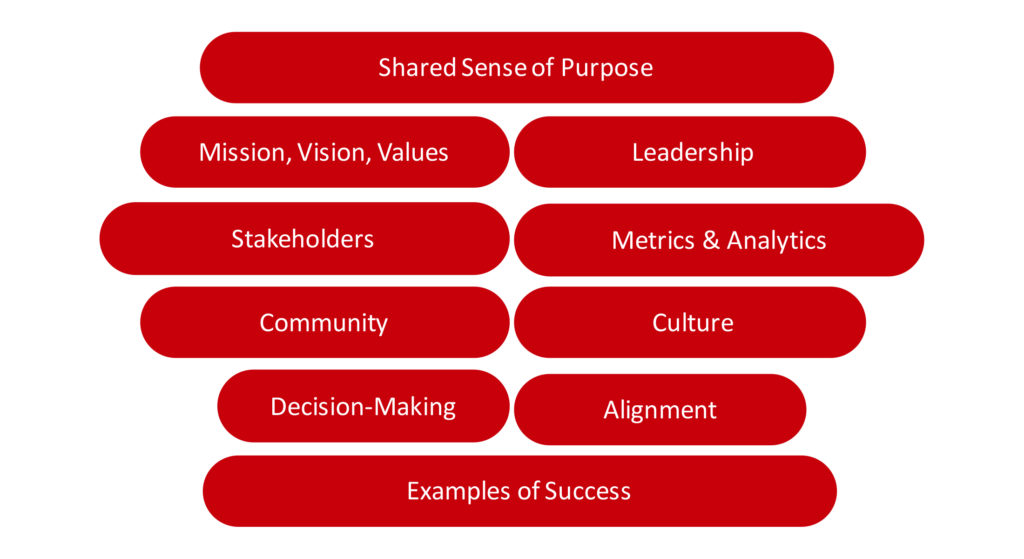Creating Purpose-Driven Organizations
March 25th, 2020
Why we care
In 1776, Adam Smith wrote in The Wealth of Nations:1
“It is not from the benevolence of the butcher, the brewer, or the baker that we expect our dinner, but from their regard to their self-interest.”
In essence, Smith was saying that businesses exist to make money for themselves, not necessarily so they can feel better about feeding their community, providing high-quality jobs, or producing their goods using environmentally-sensitive methods. This line of thinking – that businesses exist to increase the wealth of their owners (shareholders) – has been a foundational principle for many business leaders.
But not for all business leaders. Since the 1800s, leaders such as Robert Owen, James Cash Penney, and William Lever (among many others) have focused on more than the bottom line, by caring about employees, the environment, and their stakeholders.2 These leaders represent a sense that businesses have a large obligation to their employees and communities.
The tension between these two perspectives has tipped one way and then the other for years. Last fall, though, the balance tipped firmly to the side of businesses having a broader responsibility. In August, the Business Roundtable, a group of CEOs from large and significant companies, stated that, in addition to generating long-term value for shareholders and delivering value to their customers, they commit to:
- “Investing in our employees. This starts with compensating them fairly and providing important benefits. It also includes supporting them through training and education that help develop new skills for a rapidly changing world. We foster diversity and inclusion, dignity and respect.
- Dealing fairly and ethically with our suppliers. We are dedicated to serving as good partners to the other companies, large and small, that help us meet our missions.
- Supporting the communities in which we work. We respect the people in our communities and protect the environment by embracing sustainable practices across our businesses.”3
Assuming you take the group at their word, this represents a significant shift from a laser-focus on shareholders to a broader one on stakeholders.
Hypotheses
Our hypotheses for this study include the following:
- The underlying factors contributing to CEOs, senior leaders, and boards of directors embracing stakeholders, in addition to shareholders, are meaningful and different from previous times business leaders have attempted this shift.
- Organizations with a purpose that focus on a broader set of stakeholders organize, manage, enable, grow, and amplify their people differently than those primarily focused on just generating shareholder value.
- These practices can be codified and scaled such that they are not limited just to a single organization.
- These organizations are developing novel – yet potentially standardized – approaches to measuring the impact of their purpose.
- These practices can positively impact an organization’s ability to generate shareholder value.
As alluded to above, this isn't the first time business leaders have focused on broader social good. However, we believe there may be some systemic changes, such as global climate change, that are different from previous iterations of this attempt. In this research, we plan to identify those factors and better understand if it really is different this time.
There are numerous examples of organizations who are already attempting to be more purpose-driven. We believe that there are similarities in these organizations’ people management practices.
We plan to better understand:
- What does “purpose” mean in these organizations and how is it measured?
- What does “purpose-driven” mean in terms of how organizations attract, engage, develop, and retain their people?
- How, overall, is the employee experience different at purpose-driven organizations?
- What do leaders do differently at purpose-driven organizations?
- What are the implications for HR?
- How do purpose-driven organizations track their quantifiable impact on stakeholders (e.g., revenue, profitability, engagement)?
This Project
We examine the following concepts in this research project:


Stacia Garr
Footnotes
- Smith, Adam. Wealth of Nations. 1776.
- O’Toole, James. The Enlightened Capitalists: Cautionary Tales of Business Pioneers Who Tried to Do Well by Doing Good. Harper Collins, 2019.
- https://www.businessroundtable.org/business-roundtable-redefines-the-purpose-of-a-corporation-to-promote-an-economy-that-serves-all-americans